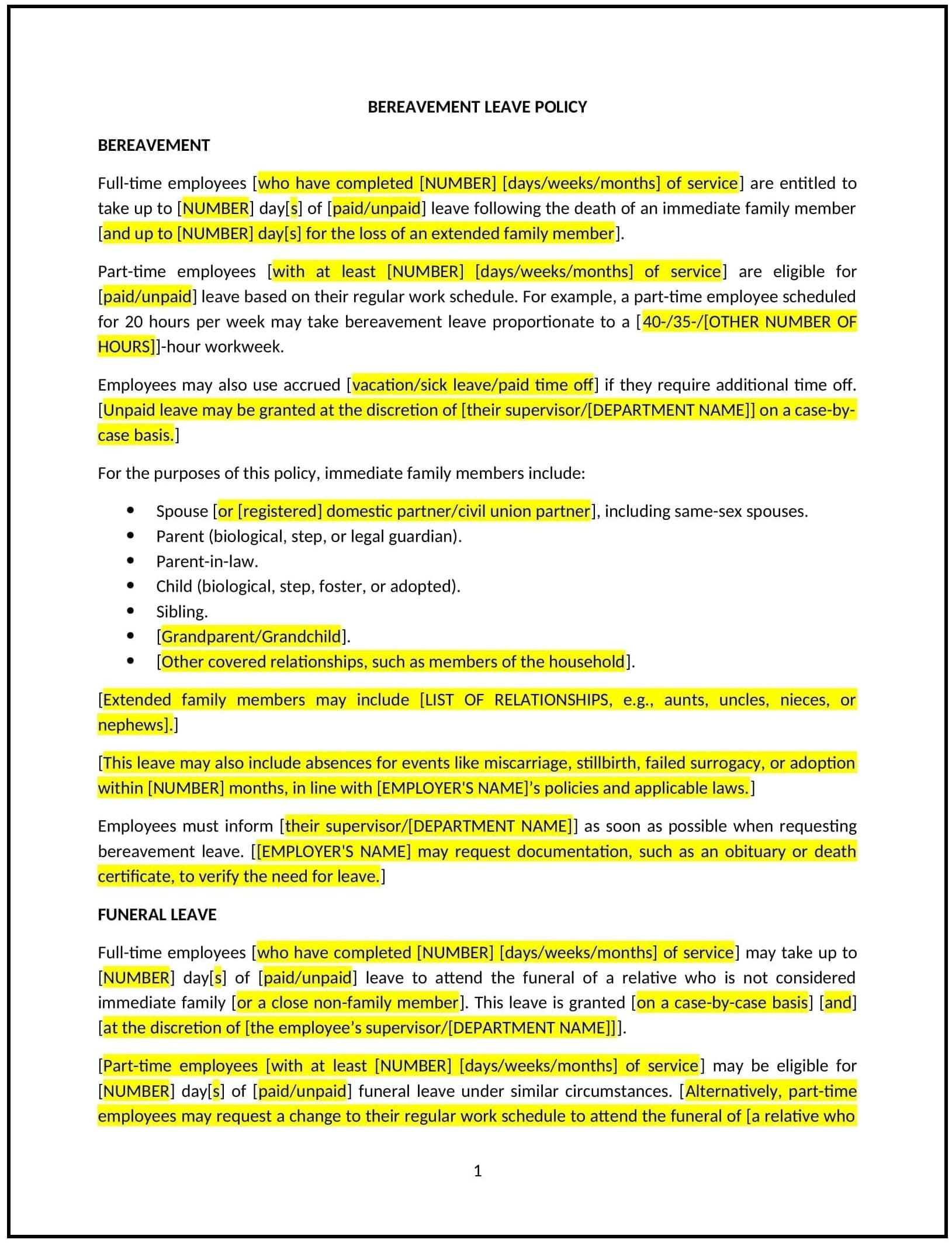Got contracts to review? While you're here for policies, let Cobrief make contract review effortless—start your free review now.

Customize this template for free
Bereavement leave policy (Nebraska)
A bereavement leave policy helps Nebraska businesses provide clear guidelines for employees who need time off due to the death of a loved one. This policy outlines the eligibility for bereavement leave, the duration of time off allowed, and the process for requesting leave. It is designed to support employees during a difficult time, allowing them to grieve and manage personal matters without the added stress of work responsibilities.
By adopting this policy, businesses in Nebraska can demonstrate compassion, promote employee well-being, and maintain fairness in how bereavement leave is handled across the organization.
How to use this bereavement leave policy (Nebraska)
- Define eligibility: Specify who is eligible for bereavement leave, including full-time and part-time employees, and the family members covered under the policy (e.g., spouse, parent, child, sibling, or other relatives).
- Set the duration of leave: Clearly state how many days of bereavement leave employees are entitled to, depending on their relationship to the deceased, and any limitations on the number of days.
- Outline the process for requesting leave: Provide clear instructions on how employees should request bereavement leave, including whether advanced notice is required and if documentation, such as a death certificate or obituary, is needed.
- Address paid vs. unpaid leave: Specify whether bereavement leave is paid, unpaid, or a combination of both. If paid, include information about whether the leave is deducted from personal or vacation days.
- Offer flexibility: Consider offering flexibility in the timing of leave, such as allowing employees to take leave over a period of days or extending the leave in certain situations.
- Protect job status: Ensure that employees taking bereavement leave are entitled to return to their position after the leave ends and that their job status will not be negatively impacted.
- Communicate the policy: Ensure all employees are aware of the policy during onboarding and in employee handbooks, with periodic reminders about how to request leave.
- Review and update: Periodically review and update the policy to reflect any changes in Nebraska labor laws, company practices, or employee needs.
Benefits of using this bereavement leave policy (Nebraska)
This policy provides several benefits for Nebraska businesses:
- Supports employee well-being: By offering bereavement leave, businesses demonstrate compassion and provide employees with the time needed to grieve and handle personal affairs.
- Reduces workplace disruptions: Clear guidelines on bereavement leave help businesses manage employee absences, ensuring that work continues smoothly while employees are away.
- Enhances employee satisfaction: A supportive leave policy fosters positive employee relations, leading to increased morale, loyalty, and trust in the company.
- Increases fairness: A well-defined policy ensures that all employees are treated equally, reducing potential disputes or feelings of favoritism regarding time off.
- Improves retention: By providing employees with the support they need during difficult times, businesses are more likely to retain valuable talent and foster long-term employee loyalty.
Tips for using this bereavement leave policy (Nebraska)
- Communicate the policy clearly: Ensure that employees understand the eligibility requirements, how to request leave, and the documentation needed for bereavement leave.
- Be compassionate and flexible: While maintaining clear guidelines, offer flexibility in how employees take their bereavement leave, recognizing that different individuals may need different amounts of time.
- Regularly monitor leave requests: Track bereavement leave to ensure that it is being used appropriately and that no one is taking excessive time off beyond what is necessary.
- Review the policy periodically: Periodically review and update the policy to ensure it remains aligned with Nebraska labor laws and reflects the evolving needs of employees.
- Offer additional support: Consider providing additional resources such as Employee Assistance Programs (EAPs) or counseling services for employees who may need extra support during their time of loss.